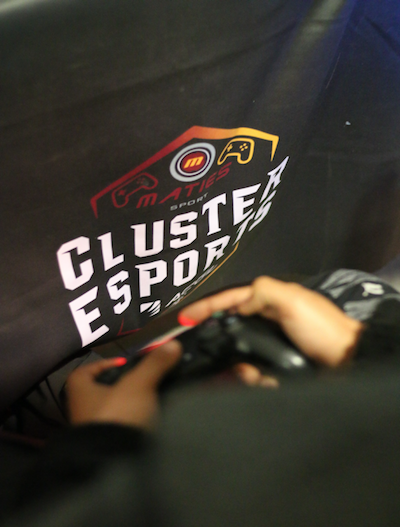 Seventeen South African universities have recently joined the eSports community, as University Sports South Africa (USSA) celebrates the first year of the sporting code’s official inclusion in the structure Kiran Maharaj, Chairperson of the USSA eSport Committee reflects on the past year and what the future holds for eSport in the country.
Seventeen South African universities have recently joined the eSports community, as University Sports South Africa (USSA) celebrates the first year of the sporting code’s official inclusion in the structure Kiran Maharaj, Chairperson of the USSA eSport Committee reflects on the past year and what the future holds for eSport in the country.
Maharaj, who is the current Senior Sport Coordinator at the University of Cape Town (UCT), initially started his eSport journey with Stellenbosch University (Maties Sport) and last year became the USSA eSport Committee Chairperson where all decisions relied heavily on him.
“The concept of eSports is fairly new in the USSA structure, it is not even a year old yet! We only started this in September 2019 and had our first USSA tournament, where we had around about ten institutions participating and that was held as my last duties at Maties Sport in 2019. The first year is going well, Covid-19 posed some challenges but we are slowly getting there,” reflected Maharaj.
The UCT Senior Sport Coordinator also has a personal experience with the sport, having taken up gaming as a form of downtime when he was playing beach volleyball and volleyball when on tour. He further says that: “It was the best way to unwind and take my mind off things. When I came back from New Zealand in 2012, I started working for Maties Sport and it was always my idea to get eSport to universities as a sporting code.”
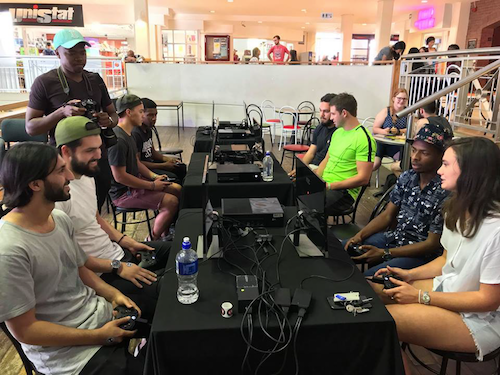 Maties Sport gamers in actionWith sport changing and evolving due to the Covid-19 pandemic, eSport has taken a front seat in the way we engage and look at modern sport. With FISU hosting an eSport Challenge last month and many other sporting codes like the English Premier League (EPL) and Formula One (F1) opting to have tournaments online for the enjoyment of their spectators, what does the future of eSport look like in South Africa?
Maties Sport gamers in actionWith sport changing and evolving due to the Covid-19 pandemic, eSport has taken a front seat in the way we engage and look at modern sport. With FISU hosting an eSport Challenge last month and many other sporting codes like the English Premier League (EPL) and Formula One (F1) opting to have tournaments online for the enjoyment of their spectators, what does the future of eSport look like in South Africa?
There are 17 universities that are affiliated with eSports around the country and Maharaj states that the number seemed to be growing as they entered into the new year. Moreover, him and his committee were planning on growing this number by embarking on a Roadshow this year.
“We wanted to get together with universities to discuss the equipment that is needed and how the programme has been run successfully between UCT and Maties over the last few years. Unfortunately, Covid-19 has put a stop to it but later this year we are working on a plan of roll-out for the next few years,” said the determined USSA eSport Chairperson.
Maharaj also says that there has been an exponential interest by students who are interested in gaming, “Currently eSport is becoming the sport choice, it is one of the unconventional or non-traditional sports and it seems to get a lot of following. I don’t seem to have to be encouraging the students, they are contacting their sport offices and wanting to play. There are constant questions about how they can play and how to get this started between institutions that I have been involved in before with eSport.”
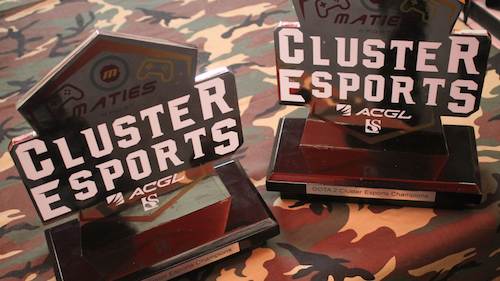 Although, this is great for the future of eSport in the country; a lot still needs to be done to make the sport nationally recognized. “With the South African team, it’s a bit of a dicey situation as there is no eSports federation in the country.”
Although, this is great for the future of eSport in the country; a lot still needs to be done to make the sport nationally recognized. “With the South African team, it’s a bit of a dicey situation as there is no eSports federation in the country.”
“A lot of things that has to happen still, as it is the fledgling sport in the university environment there needs to be a lot done federation wise nationally for the country. Hopefully, we can influence that from a university point of view and get something sorted out there where we can meet nationally and create a South African team endorsed with players from the universities.”
Maharaj insists that eSports has grown like wildfire around the world, but unfortunately in Southern Africa the environment is not that conducive for the sport. He speaks on the various challenges faced by university gamers, “There is bandwidth cost, costing of equipment, it is for universities to actually adopt the idea of eSport as being something. There is a lot of universities I have been in contact with in Netherlands, Canada and UK that have eSports as a faculty and something that they do fulltime. I think even without the pandemic; eSports has started becoming a frontrunner in this regard.”
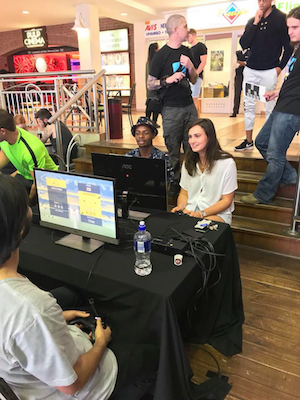 Students testing the eSport facilities at Stellenbosch University last yearMaharaj hopes that as like in F1 where an eSport version of the race is played on the same weekend or the day before the race; can tie into his idea of having eSport matches for NUSF universities alongside various tournaments. An example he gives is a Varsity Cup rugby game between Maties versus UCT, having representatives from each university playing an eSport version of the rugby challenge. eSport can then transcend a pandemic of this nature and keep growing from strength to strength.
Students testing the eSport facilities at Stellenbosch University last yearMaharaj hopes that as like in F1 where an eSport version of the race is played on the same weekend or the day before the race; can tie into his idea of having eSport matches for NUSF universities alongside various tournaments. An example he gives is a Varsity Cup rugby game between Maties versus UCT, having representatives from each university playing an eSport version of the rugby challenge. eSport can then transcend a pandemic of this nature and keep growing from strength to strength.
Three participants from South Africa last month took place in the FISU eSport Challenge, Maharaj speaks about his experience with this: “The recent FISU eSport Challenge, it was a trial for us. There was a lot of obstacles, especially of connectivity and bandwidth requirements which interplayed. They played relatively well in the opening rounds, I take my hat off to the committee and universities who managed to pull through and get everything sorted out so they could play. I think the player from Wits got first into the competition which was a great achievement for us, we were also one of the countries that entered three players instead of two. We would love to get more involved, I think we would like to get involved with assisting the set-up of the tournament and logistics the next time it comes around.”
Furthermore, in this past year Maharaj and his team have taken vital lessons in promoting and understanding eSport. “The most important lessons we have learnt so far with regards to pushing the agenda of eSports, we are pushing the agenda to a group that still has to understand the nuances of it being an actual sport and its requirements.
We need to come to the understanding that eSport in South Africa is not going to bring in the millions and millions of dollars that you see on the global scale. A lot of people when they hear eSport get stuck in that realm of the money put into the sport. These are stumbling blocks in South Africa and the understanding should be about how to get more students playing on the lower levels first and the biggest thing is to recognize eSport as something that could grow quickly and positively for students and institutions,” he reiterated.
In challenging the notion that eSport is not a competitive sport and silencing the critics that come with it, Maharaj had this to say: “My kneejerk reaction would be, don’t knock it till you have tried it. The critics probably have never played eSport before or have taken it up as a sport, it is more a lack of understanding that is leading to this. I think people need to give it a shot. I am not a good gamer but when you pick up a controller and play, you get immersed into something. If you attend any of the international games or watched this online on Twitch or Jinx, you see how competitive the players do get. If F1 has it as part of their racing weekend, then it must be competitive!” said Maharaj enthusiastically.
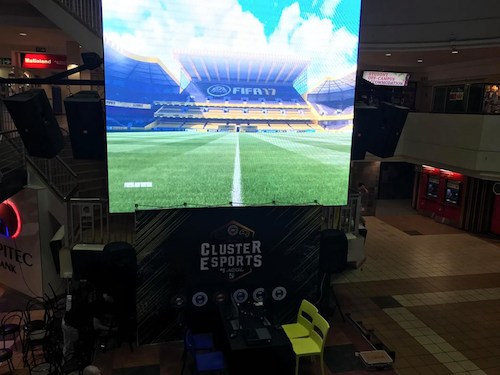
Maharaj’s parting words on eSport and what he hopes is in store for the future of this sport in universities, “I think with eSport like any other sport it needs to be managed correctly and appropriately. eSport is providing new ways of dealing with enagagement and interactions, my next idea was taking things virtually where supporters can immerse themselves in the game. The technology is growing so quickly that you can actually start doing those things!
In the current environment with the pandemic where you can’t interact with people physically this provides a visceral experience to now doing it in the safety of your own home. I encourage people to not look at eSport as people playing with controllers but actually experience it. I tell students to like an idea for 15 minutes, just like it, feel it, believe it and be it; and if you still don’t agree with it then you have your answer. That is the same thing people should do when they are looking at eSport,” he concluded.
